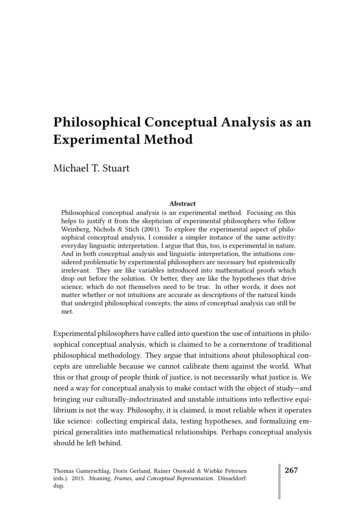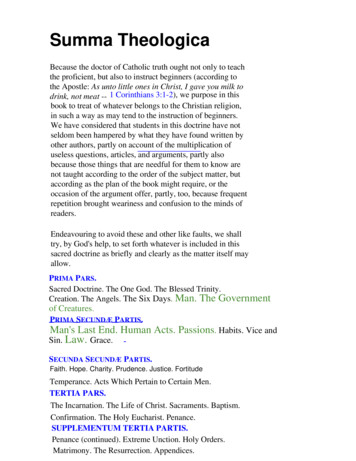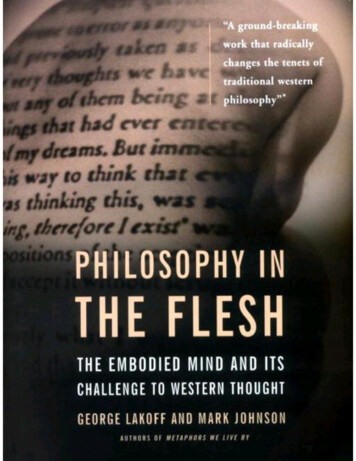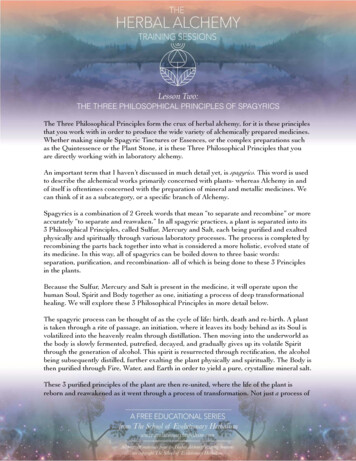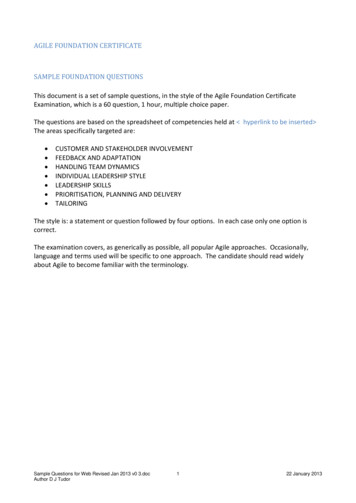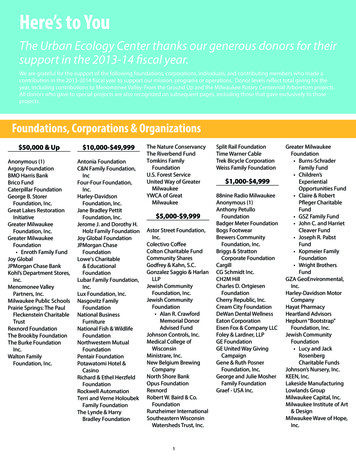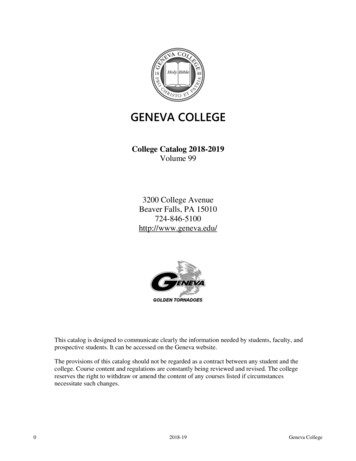
Transcription
M.A EducationPAPER-IPHILOSOPHICAL FOUNDATIONOF EDUCATIONAuthorShri Nikunja Ranjan DashD.D.C.E.Education For AllDIRECTORATE OF DISTANCE & CONTINUING EDUCATIONUTKAL UNIVERSITY: VANIVIHAR,BHUBANESWAR:-751007
M.A EducationPAPER-IPHILOSOPHICAL FOUNDATIONOF EDUCATIONAuthorShri Nikunja Ranjan DashD.D.C.E.Education For AllDIRECTORATE OF DISTANCE & CONTINUING EDUCATIONUTKAL UNIVERSITY: VANIVIHAR, BHUBANESWAR:-751007
PHILOSOPHICAL FOUNDATION OF EDUCATIONPaper-IAuthor :Mr. Nikunja Ranjan DashPublished by :DIRECTORATE OF DISTANCE & CONTINUING EDUCATIONUTKAL UNIVERSITY, VANI VIHARBHUBANESWAR-751 007Phone No.: 0674-2376700 Copyright :PUBLISHERPublished : 2015Copiess : . Nos.Printed at :Jigun GraphicsBadambadi, Cuttack-1
D.D.C.E.Education For AllDIRECTORATE OF DISTANCE & CONTINUING EDUCATIONUTKAL UNIVERSITY, VANI VIHARBHUBANESWAR-751 007From the Director's DeskThe Directorate of Distance & Continuing Education, originally established as the University Evening Collegeway back in 1962 has travelled a long way in the last 52 years. ‘EDUCATION FOR ALL’ is our motto.Increasingly the Open and Distance Learning institutions are aspiring to provide education for anyone, anytimeand anywhere. DDCE, Utkal University has been constantly striving.to rise up to the challenges of OpenDistance Learning system. Nearly ninety thousand students have passed through the portals of this greattemple ofleaming. We may not have numerous great tales of outstanding academic achievements but wehave great tales of success in life, of recovering lost opportunities, tremendous satisfaction in life, turningpoints in career and those who feel that without us they would not be where they are today. There are alsoflashes when our students figure in best ten in their honours subjects. In 2014 we have as many as fifteenstudents within top ten of honours merit list of Education, Sanskrit, English and Public Administration,Accounting and Management Honours. Our students must be free from despair and negative attitude. Theymust be enthusiastic, full of energy and confident of their future. To meet the needs of quality enhancementand to address the quality concerns of our stake holders over the years, we are switching over to selfinstructional material printed courseware. Now we have entered into public private partnership to bring outquality SIM patterncourseware. Leading publishers have come forward to share their expertise with us. Anumber of reputed authors have now prepared the course ware. Self Instructional Material in printed bookformat continues to be the core learning material for distance learners. We are sure that students would gobeyond the course ware provided by us. We are aware that most of you are working and have also familyresponsibility. Please remember that only a busy person has time for everything and a lazy person has none.We are sure you will be able to chalk out a well planned programme to study the courseware. By choosing topursue a course in distance mode, you have made a commitment for self improvement and acquiring highereducational qualification. You should rise up to your commitment. Every student must go beyond the standardbooks and self instructional course material. You should read number of books and use ICT learning resourceslike the internet, television and radio programmes etc. As only limited number of classes will be held, astudent should come to the personal contact programme well prepared.ThePf'P should be used for clarificationof doubt and counseling. This can only happen if you read the course material before PCP. You can alwaysmail your feedback on the course ware to us. It is very important that you discuss the contents of the coursematerials with other fellow learners.We wish you happy reading.(S.P. Pani)DIRECTOR
nship between Philosophy Education. Branches ofPhilosophy: Metaphysics, Epistemology & Axiology.1Modern Schools of Philosophy – Logical Positivism,Analytical Philosophy & Relativism30Western Schools of Philosophy: Idealism, Naturalism,Pragmatism, Realism, Existentialism, Reconstructivism& Perrinialism61Educational Heritage of India: Vedic Education,Buddhistic Education, Purushartha. M.K. Gandhi,Vivekananda, R.N. Tagore & Aurobindo109
UNIT-INOTESRELATIONSHIP BETWEEN PHILOSOPHY AND EDUCATION.BRANCHES OF PHILOSOPHY – METAPHYSICS,EPISTEMOLOGY & AXIOLOGY.Unit 1.31.2.1Meaning of Philosophy1.2.2Definitions of Philosophy1.2.3Features of PhilosophyBranches of Philosophy1.3.1Metaphysics1.3.1.1 Metaphysics & Education1.3.2Epistemology1.3.2.1 Epistemology & Education1.3.3Axiology1.3.3.1 Axiology & Education1.4Education1.4.1Meaning of Education1.4.1.1 Narrower meaning1.4.1.2 Wider meaning1.51.4.2Definitions of Education1.4.3Nature of education1.4.4Focus of education in 21st centuryRelation between Philosophy & Education1.5.1Dependence of education on philosophy1.5.2Dependence of philosophy on education1.5.3Objectives of studying Educational Philosophy1.5.4Scope of Educational Philosophy1.5.5Function of Educational Philosophy1.6Let Us Sum Up1.7Glossary1.8Model Questions1
NOTES1.0INTRODUCTIONBroadly speaking each academic discipline (say history, politics, economics and evensciences) have their own philosophy or general guiding principles and theoretical frame works.Education as liberal arts subjects is no exceptions. There is indeed a rich philosophical traditionsrelating to education in both east and west. Every post-graduate students of education need to befamiliar with the theories and philosophy of education. Educational practices and planning in allparts of the world are influenced by theories and philosophy of education and values the state andsociety desires to promote through education. In this unit we shall attempt to familiarize you withphilosophy of education.1.1OBJECTIVESAfter studying this unit, you will be able: Explain the meaning, features & different branches of philosophy. Illustrate the meaning & nature of education. Compare how philosophy & education are related to each other. Sate the meaning of educational philosophy. Analysis the value of studying educational philosophy.1.2PHILOSOPHYPhilosophy in a general sense is conceived a person’s “sum of his fundamental beliefs andconvictions”. We have some ideas concerning physical objects, our fellow persons, the meaningof life, death, God, right and wrong, beauty and ugliness, and the like. Of course, these ideas areacquired in a variety of ways, and they may be vague and confused. Philosophy is a guide forliving; because the issues it addresses are basic and pervasive, determining the course we takein life. Hence we can say that all the aspects of human life are influenced and governed by thephilosophical consideration.Philosophers always ask these questions: Who we are? Is there a higher existence thatdetermines our existence? What is the relationship between nature and human beings? What isthe meaning of life? Are our senses reliable in telling us about the truth of the universe? How dowe get to know about the world? What is the relationship between the mind and the body? Theyfurther ask these questions: What is happiness? What is virtue? What is the relationship betweenindividuals and the collective? How can we organize a society and an economy that promote thecommon good? What methods should we employ to find out truth from false statements? Can weever hope to find out the truth of our existence?Philosophy is reflection of the above questions. Hence, philosophy is the study of generaland fundamental problems concerning matters such as existence, knowledge, truth, beauty, law,justice, validity, mind, and language. Moreover, philosophy is rationally thinking, of a more orless systematic kind about the general nature of the world – metaphysics or theory of existence,the justification of belief - epistemology or theory of knowledge, and the conduct of life - ethicsor theory of value.1.2.1MEANINGOxford Collins Cobuild Dictionary (2006) –2 Philosophy is the study or creation of theories about basic things such as the nature ofexistence, knowledge, thought, or about how people should live.
Philosophy is a particular theory that someone has about how to live or how to deal with aparticular situation.NOTESBabylon English Dictionary: Study the principle of existence behavior and knowledge;study the nature of human thought & of the world.The word philosophy comes from a combination of two Greek words- “philos” meaning“love” and “sophi” meaning “wisdom.” Etymologically, philosophy means the love of wisdom.To love something is to desire it. So, for many Greeks, the philosopher was the one who desiredwisdom. Wisdom is not only knowledge. One may have knowledge, but he may not be wise.Wisdom constitutes knowledge plus its implication in all circumstances. Thus philosophy givesman that wisdom with the help of which they understand the whole universe and its implication inrelation to themselves & the people around. Hence philosopher could also be characterised asthe “friend of wisdom”. In this regard, Plato in his “Republic” stated that “He who has a tastefor every sort of knowledge and who is curious to learn and is never satisfied may be termedphilosopher”. It means a philosopher is interested in all type of knowledge where as a physicistin physical process of universe, an historian in the past events, a geographer in the naturalcondition of the universe, a biologist in the biological process etc. But a philosopher has amultidimensional outlook and interest. The philosopher is thoughtful, remains in a thoughtfulmood, being in search of new ideas, new knowledge with the help of his growing wisdom.Philosophers are interested in the first principle and the final conclusion of all branches ofknowledge. Philosophers come under different philosophical school of thought such as idealist,naturalist, pragmatist, existentialist, perennialist, realist, essentialist, progressivist etc. accordingto their approach to answer the philosophical enquire. Philosophies vary from culture to cultureplace to place and time to time. Thus different person having their different ideologies, ways oflife, tend to have different types of philosophies. Here, the search of philosopher is for understandingMan, Nature and the Universe.Philosophy is a system of beliefs about reality. It is integrated view of the world. It includesan understanding of the nature of existence, humankind, and its role in the world. Philosophy isthe foundation of knowledge. It provides premises by which man can discover truth, and uses hismind to support his life. In conclusion we can say that philosophy is a critical examination ofreality characterized by rational inquiry that aims at the Truth for the sake of attaining wisdom.1.2.2DEFINITIONSPhilosophy has been defined variously by scholars and thinkers:Aristipus (435-356 B.C): “Philosophy is the ability to feel at ease in any society”.Aristotle: “Philosophy is the science which investigates the nature of being, as it is in itself”.Brightman: “Philosophy may be defined as the attempt to think truly about human experience asa whole and to make our whole experience intelligible”.Cicero, Marcus Tullius (106-43 B.C): “Philosophy is the mother of all arts and the true medicineof mind”.Coleridge, Samuel Taylor (1772-1834): defined it as the, “Science of Sciences”.Dr. Baldev upadhyaya: Methodical training or “Sadhana”.Dr. Radhakrishnan (1888-1975): Philosophy is a logical inquiry into the nature of reality.Dumery H. in his book the “problem of god” (1964) defines philosophy as a critical reflection onconcrete action.3
NOTESEpictetus: “The beginning of philosophy is the conflict between opinions”.Fitche’s views: Philosophy is the science of knowledge.Harold Titus: “A person philosophy is the sum of his fundamental beliefs and convictions”.Henderson (1947): Philosophy is a search for a comprehensive view of nature, an attempt atuniversal explanation of nature of thing.Herbert Spencer: Philosophy is concerned with everything as a universal science.Huxley, Aldous (1984-1963): States, men live in accordance with their philosophy of life, theirconception of the world.Indian context: The term Philosophy indicates – “Visionary”, “Drastha”, “Darsan”,“Darsanika”.John Dewey: Critical reviewing of the familiar things.Kabir , Huyaun (1902-1969): States that philosophy “ seek to give knowledge of the whole”.Kant Immanuel (1724-1804): Philosophy as science and criticism of cognition.Platto : “He who has a taste for every sort of knowledge and who is curious to learn and is neversatisfied may be termed philosopher”.Raymant : An unceasing effort to discover the general truth that lies behind the particular facts,to discern also the reality that lies behind the appearance.Russel, Bertrand (1872-1970): States, “Philosophy is to be studied not for the sake of anydefinite answers to its questions . But rather for the sake of the questions themselves, becausethese questions enlarge our conception of what is possible but above all because the mind alsois rendered great and becomes capable of that union with the universe which constitutes its heistgoal.”R.W.Seller: philosophy is persistent attempt to gain insight into the nature of the world and ofourselves by means of systematic reflections”.1.2.31.FEATURESPhilosophy is a set of views or beliefs about life and the universe, which are often helduncritically.We refer to this meaning as the informal sense of philosophy or “having” a philosophy.Usually when a person says “my philosophy is,” he or she is referring to an informal personalattitude to whatever topic is being discussed.2.Philosophy is a process of reflecting on and criticizing our most deeply held conceptionsand beliefs.This is the formal sense of “doing” philosophy. These two senses of philosophy-”having”and “doing”- cannot be treated entirely independent of each other, if we did not have a philosophyin the formal, personal sense, then we could not do a philosophy in the critical, reflective sense.4Having a philosophy, however, is not sufficient for doing philosophy. A genuine philosophicalattitude is searching and critical; it is open-minded and tolerant-willing to look at all sides of anissue without prejudice. To philosophize is not merely to read and know philosophy; there areskills of argumentation to be mastered, techniques of analysis to be employed, and a body ofmaterial to be appropriated such that we become able to think philosophically. To philosophizealso means to generalise.
Philosophers are reflective and critical. They take a second look at the material presentedby common sense. They attempt to think through a variety of life’s problems and to face all thefacts involved impartially. The accumulation of knowledge does not by itself lead to understanding,because it does not necessarily teach the mind to make a critical evaluation of facts that entailconsistent and coherent judgment. Critical evaluations often differ. Philosophers, theologians,scientists, and others disagree, first because they view things from different points of view andwith different assumptions. Their personal experiences, cultural backgrounds, and training mayvary widely. This is especially true of people living at different times and in different places. Asecond reason philosophers disagree is that they live in a changing universe. People change,society changes, and nature changes. Some people are responsive and sensitive to change; otherscling to tradition and the status quo, to systems that were formulated some time ago and thatwere declared to be authoritative and final. A third reason philosophers disagree is that they dealwith an area of human experience in which the evidence is not complete. The evidence we dohave may be interpreted in various ways by different people. Despite these disagreements,however, philosophers continue to probe, examine, and evaluate the material with the hope ofpresenting consistent principles by which we can live.3.NOTESPhilosophy is a rational attempt to look at the world as a whole.Philosophy seeks to combine the conclusions of the various sciences and human experienceinto some kind of consistent world view. Philosophers wish to see life, not with the specializedslant of the scientist or the business person or the artist, but with the overall view of someonecognizant of life as a totality.Although there are difficulties and dangers in setting forth any world view, there also aredangers in confining attention to fragments of human experience. Philosophy’s task is to give aview of the whole, a life and a world view, and to integrate the knowledge of the sciences withthat of other disciplines to achieve a consistent whole. Philosophy, according to this view, attemptsto bring the results of human inquiry— religious, historical, and scientific into some meaningfulinterpretation that provides knowledge and insight for our lives.4.Philosophy is the logical analysis of language and the clarification of the meaning ofwords and concepts.Certainly this is one function of philosophy. In fact, nearly all philosophers have usedmethods of analysis and have sought to clarify the meaning of terms and the use of language.Some philosophers see this as the main task of philosophy, and a few claim this is the onlylegitimate function of philosophy. Such persons consider philosophy a specialized field servingthe sciences and aiding in the clarification of language rather than a broad field reflecting on allof life’s experiences. This outlook has gained considerable support during the twentieth century.It would limit what we call knowledge to statements about observable facts and their interrelationsi.e. to the business of the various sciences. Not all linguistic analysts, however, define knowledgeso narrowly. Although they do reject and try to “clean up” many non-scientific assertions, manyof them think that we can have knowledge of ethical principles and the like, although this knowledgeis also experientially derived. Those who take the narrower view neglect, when they do not deny,all generalized world views and life views, as well as traditional moral philosophy and theology.From this narrower point of view, the aim of philosophy is to expose confusion and nonsense andto clarify the meaning and use of terms in science and everyday affairs.5
NOTES5.Philosophy is a group of perennial problems that interest people and for whichphilosophers always have sought answers.Philosophy presses its inquiry into the deepest problems of human existence. Some of thephilosophical questions raised in the past have been answered in a manner satisfactory to themajority of philosophers. Many questions, however, have been answered only tentatively, andmany problems remain unsolved. What are philosophical questions? The question “Did Rammake a false statement on his income tax return?” is merely a question of fact. But the questions“What is truth?” and “What is the distinction between right and wrong?” have philosophicalimportance. Sometimes we think seriously about fundamental life issues: What is life and whyam I here? Why is there anything at all? What is the place of life in this great universe? Is theuniverse friendly or unfriendly? Do things operate by chance or through sheer mechanism, or isthere some plan or purpose or intelligence at the heart of things? Is my life controlled by outsideforces, or do I have a determining or even a partial degree of control? Why do people struggleand strive for their rights, for justice, for better things in the future? What do concepts like“right” and “justice” means, and what are the marks of a good society? Often men and womenhave been asked to sacrifice their lives, if need be, for certain values and ideals. What are thegenuine values of life and how can it attained? Is there really a fundamental distinction betweenright and wrong, or is it just a matter of one’s own opinions? What is beauty? Should religioncount in a person’s life? Is it intellectually valid to believe in God? Is there a possibility of a “lifeafter death?” Is there any way we can get an answer to these and many related questions?Where does knowledge come from, and can we have any assurances that anything is true?These questions are all philosophical. The attempt to seek answers or solutions to themhas given rise to theories and systems of thought, such as idealism, realism, pragmatism, analyticphilosophy, existentialism, phenomenology, and process philosophy. Philosophy also means thevarious theories or systems of thought developed by the great philosophers - Socrates, Plato,Aristotle, Augustine, Aquinas, Descartes, Spinoza, Locke, Berkeley, Kant, Hegel, Nietzsche,Royce, James, Dewey, Whitehead, and others. Without these people and their thoughts philosophywould not have the rich content it has today. Even though we may be unconscious of the fact, weare constantly influenced by ideas that have come down to us in the traditions of society.From the above discussion we came to know that-6 Philosophy is systematic enquiry about the ultimate reality of the universe. Philosophy is study of general principles & understanding of all that comes in the range ofhuman experience. Philosophy is a living force. It is a way of life. It is the oldest and original discipline of thought. It is a search for truth and reality. It is based on enquire about life and existence. It is logical in its approach. It is ever growing and developing. Philosophers try to see life as a whole. Philosophy is related to condition of life and society.
Philosophy is a product of time and circumstances. It is flexible in its approach. Seeks the knowledge of whole Science of knowledge It is the study of metaphysics beyond one physical world and its relation with the physicalworld. Methods of philosophy include logic, symbolism, reflections, science and reason.1.3NOTESBRANCHES OF PHILOSOPHYPhilosophy deals with the most basic issues faced by human beings. The content of philosophyis better seen as asking questions rather than providing answers. It can even be said that philosophyis the study of questions. Van Cleve Morris has noted that the crux of the matter is asking the“right” questions. By “right” he meant questions that are meaningful and relevant- the kind ofquestions people really want answered and that will make a difference in how they live andwork. Philosophical content has been organized around three fundamental categories: Metaphysics -The study of questions concerning the nature of reality or existence.Typical Metaphysical questions:What is reality?Does God exist, and if so, can we prove it?The problem of evilAre human actions free, or are they determined by some forces outside of our control?Do minds/souls exist, or are humans’ simply complex physical objects?What is time?What is the meaning of life?Is there life after death? etc. Epistemology -The study of the nature of knowledge and how these are attained andevaluated.Typical Epistemological questions:What is knowledge and how does it differ from belief or opinion?What is truth, and how can we know if a statement is true?What are the sources of knowledge?Do absolutes exist, and if so, can we know them?What is the relationship between faith and reason? etc. and Axiology - The study of the question of value. Deals with issues of value in the followingareas:Ethics - the study of moral principles, attempts to establish rational grounds for good conductTypical Ethical questions:What is good/bad?What is right/wrong?7
NOTESWhat is the foundation of moral principles?Are moral principles universal?Social/Political Philosophy - the study of the value judgments operative in civil societyTypical Social/Political Philosophy questions:What form of government is best?What economic system is best?What is justice?Are we obligated to obey all laws of the State?What is the purpose of government?Aesthetics - the study of the nature and value of works of art and the aesthetic experienceTypical Aesthetic questions:What is a work of art?What is artistic creativity and how does it differ from scientific creativity?Why are works of art considered to be valuable?What do works of art communicate (if anything)?What is beauty?Does art have any moral obligations or constraints?Without a distinctive philosophy of reality, truth, and value, a person or group cannotmake intelligent decisions either for their individual lives or for developing an educational system.The questions addressed by philosophy are so basic that there is no escaping them. As a result,all of us, whether we consciously understand our philosophic positions or not, conduct our personallives and our corporate existence on the basis of “answers” to the basic questions of life. Thereis no decision making that is unrelated to the issues of reality, truth, and value. To put it succinctly:Philosophy drives decision making. For that reason alone, the study of the foundational questionsof philosophy is important. After all, it is better to function with understanding than to wanderthrough life in ignorance of the factors that shape our choices.With the importance of understanding the basic issues in mind, in the following pagesthese three main philosophic categories described are as under.1.3.1METAPHYSICSMetaphysics is the branch of philosophy that studies the ultimate nature of reality orexistence. It asks questions such as ‘What exists?’ or ‘What is real?’ Metaphysicians seek anirreducible foundation of reality or ‘first principles’ from which absolute knowledge or truth canbe induced and deduced. The term metaphysics is derived from the Greek words “meta” means(“beyond”, “upon” or “after”) and physika, means (“physics”). Literally it refers ‘those thingsafter the physics.’ Aristotle’s writings on ‘first philosophy’ came after his treatise on physics,therefore, Aristotle’s editor, Andronicus of Rhodes, named them metaphysics.8At first, questions like, ‘What is real?’ seem too simple to bother asking. But considerGeorge Knight’s example about the existence of a floor and one will see that the question has farreaching implications: What is exactly the nature of the floor upon which you stand? It may seemto have a rather straightforward existence. It is obviously flat, solid, and smooth; it has a particular
color; it is composed of an identifiable material, such as wood or concrete; and it supports yourweight Suppose, however, that a physicist enters the room and is questioned about the reality ofthe floor. She will reply that the floor is made of molecules; that molecules consist of atoms,electrons, protons, and neutrons; and these, finally, of electric energy alone. A third position isoffered by a passing chemist To him the floor is a hotbed of hydrocarbons associated in aparticular way and subject to certain kinds of environmental influences, such as heat, cold,wetness, dryness, and oxidation.NOTESIt is evident that the question of reality is not as simplistic as it appears. If the reality of acommon floor is confusing, what about the larger problems that presents themselves as mankindsearches for the ultimate reality of the universe?Metaphysical questions are the most basic to ask because they provide the foundation uponwhich all subsequent inquiry is based. Metaphysical questions may be divided into four subsets.First, the cosmological aspect. Cosmology consists in the study of theories about the origin,nature, and development of the universe as an orderly system. Questions such as these populatethe realm of cosmology: “How did the universe originate and develop? Did it come about byaccident or design? Does its existence have any purpose?”A second metaphysical aspect is the theological. Theology is that part of religious theorythat deals with conceptions of and about God. “Is there a God? If so, is there one or more thanone? What are the attributes of God? If God is both all good and all powerful, why does evilexist? If God exists, what is His relationship to human beings and the ‘real’ world of everydaylife?”A third subset of metaphysics is the anthropological. Anthropology deals with the study ofhuman beings and asks questions like the following: What is the relation between mind and body?Is mind more fundamental than body, with body depending on mind, or vice versa? What ishumanity’s moral status? Are people born good, evil, or morally neutral? To what extent areindividuals free? Do they have free will, or are their thoughts and actions determined by theirenvironment, inheritance, or a divine being? Does each person have a soul? If so, what is it?People have obviously adopted different positions on these questions, and those positions influencetheir political, social, religious, and educational ideals and practices.The fourth aspect of metaphysics is the ontological. Ontology is the study of the nature ofexistence, or what it means for anything to exist. Several questions are central to ontology: “Isbasic reality found in matter or physical energy (the world we can sense), or is it found in spiritor spiritual energy? Is it composed of one element (e.g., matter or spirit), or two (e.g., matterand spirit), or many?” “Is reality orderly and lawful in itself, or is it merely orderable by thehuman mind? Is it fixed and stable, or is change its central feature? Is this reality friendly,unfriendly, or neutral toward humanity?”1.3.1 .1METAPHYSICS & EDUCATIONEven a cursory study of either historical or contemporary societies will reveal the impactof the cosmological, theological, anthropological, and ontological aspects of metaphysics upontheir social, political, economic, and scientific beliefs and practices. People everywhere embraceanswers to these questions and then live their daily lives in keeping with those assumptions.There is no escape from metaphysical decisions; unless on
books and self instructional course material. You should read number of books and use ICT learning resources . (say history, politics, economics and even . Education as liberal arts subjects is no exceptions. There is indeed a rich philosophical traditions relating to education i

